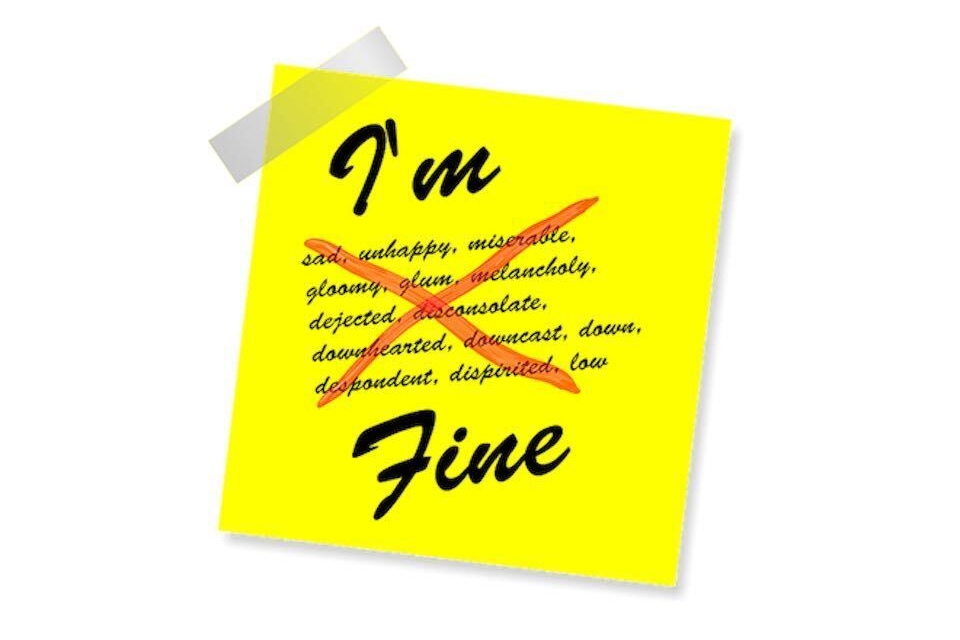“Fine.” The word seems innocent enough. I’m referring to the “I’m fine”, or “it’s fine” we hear and overuse multiple times a day. Don’t be fooled. Fine is a four-letter word and there’s a lot of angst packed into it.
For instance, I often feel like a fraud. At times I put forth an alternate reality. My gut tells me other people do too. Why? Because our society encourages the brave front, the presentation of a more perfect life. The kind depicted on social media. I am constantly baffled as to why there is an underlying pressure to always be “fine.” Real life isn’t always freaking fine.
Does it really make you less of a person if you are experiencing challenges? Does it mean you are incapable of solving problems or too weak to rise above them? Worst of all, can you become a magnet for despair and somehow attract problems in a way that others fear is more contagious than COVID? The answer is a resounding NO. You’re simply human.
Urban Dictionary defines it this way: ‘I’m fine’ is the most told lie in the English language. Used when someone is, in fact, not fine, but drowning in their sadness. They say ‘I’m fine’ because they don’t want to worry anyone with their problems, and it’s easier than explaining what’s wrong.
Fine is not a feeling
Exploring the origin and what the word actually stands for, I discovered 12-step recovery programs use a colorful description in the form of an acronyms. There’s several in this context, and here’s the gist of it:
F = Fouled Up
I = Insecure
N = Neurotic
E = Emotional
OR
F = Feelings
I = Inside
N = Not
E = Expressed
Whoa – feelings inside not expressed? Hits the nail on the head. Who among us has not felt at least one of these descriptives apply? On the flip side, we all strive for days where this acronym is more fitting:
F = Fun
I = Intelligent
N = Nuanced
E = Exceptional
Now when someone tells me they’re fine, I’m going to question which of these acronyms might be in play. How does one navigate the fine line between genuine concern and nosy prying?
Let’s talk a little psychology
There are three levels of communication: Superficial, intimate, and behavioral. The use of “fine” generally falls into superficial territory. This type of communication is the most common when interacting with others casually. For example, if a barista asks, “How are you?” your response is polite and appropriate, automatically rolls off your tongue, and checks the boxes associated with social norms.
Superficial talk accounts for the bulk of our day, yet it’s the least satisfying. People need to be seen, understood, and felt. Expressions of true thoughts and feelings are reserved for intimate communication, but this type of connection is lacking in an environment that discourages openness.
The desire to avoid uncomfortable conversations often overrides our desire for connection. We rationalize our silence with excuses like “My saying anything won’t help anyway,” or “Maybe I’m over-reacting.” So, rather than take the risk of meaningful dialogue, we default to the rote answer of “fine.”
This leads to nothing but trouble – and the third type of communication – which is behavioral. When someone can’t express vulnerable thoughts and feelings, they may instead act out. Ignoring feelings and trying to “let it go” doesn’t work. It’s like slapping on a Band-Aid. You can cover up the injury, but it’s still there. Getting infected.
We can avoid the risk of infection to our collective psyches by expanding our vocabulary. Let’s bridge the gap between superficial and intimate conversations with honest words instead of automatically hiding behind “fine.”
How are you?
I challenge you to take a few baby steps beyond social niceties. I’m not suggesting that you over-share embarrassing intimacies with unsympathetic strangers or unreceptive colleagues. However, you can deviate from your comfort zone when someone asks you, with genuine interest, how you’re doing.
If “fine” is always on the tip of your tongue, pause and think about it. How are you really? “Fine” is a placeholder and means next to nothing. If you’re doing well – use more expressive, meaningful words. If you’re having a bad time, offer up something true that doesn’t discount your feelings. You might just give another person a chance to share their experience, provide a moment of support, or simply listen.
Settling for fine, which in our vocabulary often means not well, you aren’t actively advocating for change. When you move beyond the expected, automatic vernacular – you may connect on a completely new level with someone who becomes a part of your village.





This Post Has One Comment
Your first FINE acronym made me laugh out loud, nod and chuckle in agreement ;). Thank you!❤️